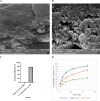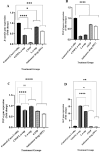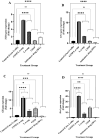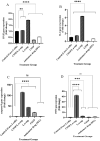Anti-cancer properties of chitosan /Lactobacillus acidophilus secretome nanoparticle on signaling pathways of colorectal cancer in colon adenocarcinoma (Caco-2) cell line
- PMID: 40457310
- PMCID: PMC12128269
- DOI: 10.1186/s12885-025-14315-5
Anti-cancer properties of chitosan /Lactobacillus acidophilus secretome nanoparticle on signaling pathways of colorectal cancer in colon adenocarcinoma (Caco-2) cell line
Abstract
Background: Colorectal cancer (CRC) has emerged as a global health concern, as evidenced by its position as the second leading cause of cancer-related mortality. This underscores the necessity for effective disease management strategies. The present study aims to assess the impact of chitosan nanoparticles (CSNP) conjugated with the Lactobacillus acidophilus secretome (CSNP/L.a-sup), on the signaling pathways associated with CRC.
Methods: The CSNP/L.a-sup was prepared using an ionic gelation procedure, and its particle size, surface charge, and morphology were evaluated using dynamic light scattering, zeta potential, and scanning electron microscopy. The encapsulation efficiency (EE) and the protein released from CSNP/L.a-sup were assayed using a BCA assay kit. CSNP/L.a-sup toxicity on colon adenocarcinoma (Caco-2) and human dermal fibroblasts (HDF) cells was assessed via the MTT assay. The expression levels of CRC signaling pathway genes were examined using real-time polymerase chain reaction (PCR).
Results: The size of CSNP/L.a-sup was detected at 478.6 ± 219.9 nm, with a surface charge of -8.9 mV. The protein released from CSNP/L.a-sup was observed 76% at pH ~ 6.8 after 48 h, with EE of 74.6%. The viability of Caco-2 and HDF cells against CSNP/L.a-sup was found to be 85.5% and 92.6%, respectively. The uptake of CSNP/L.a-sup by Caco-2 cells occurs in a time-dependent manner, with initial absorption observed within 1 h and substantial internalization achieved after 3 h. CSNP/L.a-sup led to a significant decrease in the expression of β-Catenin, TGF-α, and TGF-β genes, with respective changes of 0.42, 0.79, and 0.16-fold. In contrast, CSNP/L.a-sup led to a significant increase in the expression of PTEN and caspase-9 suppressor genes, with changes of 42.1 and 114.3-fold, respectively. The inhibitory effect of CSNP/L.a-sup on TGF-α gene expression appears to be more closely associated with the CSNP compartment, while the enhancing effect of CSNP/L.a-sup on PTEN gene expression is linked to L.a-sup.
Conclusion: This investigation signifies an inaugural exploration into the potential of a combination therapy comprising secretome of probiotic bacteria and chitosan nanostructures. This approach constitutes a substantial advancement in the field of developing efficacious treatment strategies, offering novel insights into the management of CRC.
Keywords: Lactobacillus acidophilus; Anti-cancer; Chitosan nanoparticle; Colorectal cancer; Signaling pathways.
© 2025. The Author(s).
Conflict of interest statement
Declarations. Ethics approval: This project has been approved by the Ethic Committee of Tarbiat Modares University (code: IR.MODARES.REC.1401.253). Consent for publication: Not applicable. Competing interests: The authors declare no competing interests.
Figures







References
-
- Roshandel G, Ferlay J, Ghanbari-Motlagh A, Partovipour E, Salavati F, Aryan K, et al. Cancer in Iran 2008 to 2025: recent incidence trends and short‐term predictions of the future burden. Int J Cancer. 2021;149(3):594–605. - PubMed
-
- Rahmati A, Homayouni Tabrizi M, Karimi E, Zarei B. Fabrication and assessment of folic acid conjugated-chitosan modified PLGA nanoparticle for delivery of alpha Terpineol in colon cancer. J Biomater Sci Polym Ed. 2022;33(10):1289–307. - PubMed
MeSH terms
Substances
LinkOut - more resources
Full Text Sources
Medical
Research Materials

